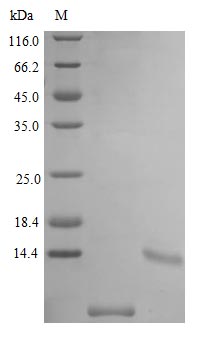Advance your immunology research with Recombinant Mouse Uteroglobin (Scgb1a1), a multifunctional secretory protein with immunosuppressive and anti-inflammatory properties. This full-length, mature protein is expressed in E. coli and encompasses the 22-96aa region. With a tag-free format, a purity of over 98% as confirmed by SDS-PAGE and HPLC, and endotoxin levels below 1.0 EU/µg, this lyophilized powder is perfect for a wide range of research applications. Scgb1a1 demonstrates full biological activity, with an ED50 of less than 5.0 μg/ml as determined by its ability to support A549 human lung carcinoma cell adhesion, reflecting a specific activity of more than 200 IU/mg.




